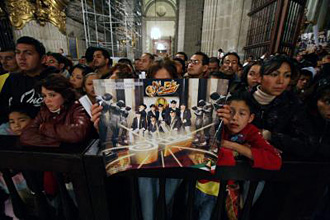 |
 |
 |
 Editorials | Issues | December 2007 Editorials | Issues | December 2007  
Musician Killings Highlight Unrelenting Violence in Mexico
 Jeremy Schwartz - Austin American-Statesman Jeremy Schwartz - Austin American-Statesman
go to original


| | Fans hold up a picture of the band K-Paz de la Sierra during a Mass on Dec. 5 honoring Sergio Gómez, the leader of the wildly popular band who was tortured and killed this month. (Alexandre Meneghini/Associated Press) |
Mexico City — Mexico is reeling from the gruesome executions of three popular musicians this month in a record year for drug violence, despite a yearlong military operation against Mexico's major drug cartels.

The high-profile murders have left many in Mexico feeling more vulnerable than ever to drug violence and wondering just how far it can reach. One musician was gunned down in her hospital bed, the second kidnapped after a concert, tortured and left on the side of the highway. The third was found with his feet and hands bound and a bag on his head.

According to counts kept by the media — the Mexican government doesn't publish such statistics — drug murders are on an unprecedented pace: The Mexico City daily El Universal has counted 2,544 executions through Dec. 5, already more than the 2,221 executions it recorded last year. In 2001, the newspaper recorded 1,080 drug killings.

At one point this year, Mexico was averaging more than 10 drug-related killings a day.

The grim statistics come amid the Mexican government's most concerted effort ever to curb the reach of drug traffickers. Mexican President Felipe Calderón has made public security the centerpiece of his first year in office, sending more than 10,000 soldiers and federal troops to confront the cartels in nearly a dozen states.

He also negotiated a $1.4 billion aid package from the United States to help fight the drug war that the U.S. Congress is debating.

But despite the federal troops, the violence has continued.

"We need to recognize that we are losing the war," conservative political analyst Sergio Sarmiento wrote in the Reforma newspaper. "The murdered artists are no different than the rest of the victims of crime in our country. Their deaths, however, have the advantage of getting the people's attention."

The country has been most shaken by the death of Sergio Gómez, the 34-year-old lead singer of the wildly popular group K-Paz de la Sierra. Gómez founded the band, which plays a style of music called Duranguense, featuring brass horns and fast-paced drums, as an immigrant in Chicago.

Gómez reportedly had received threats warning his band not to play in their native state of Michoacan before he was kidnapped and killed.

The same week Gómez's body was discovered, Zayda Peña of Zayda y Los Culpables, was shot to death in her hospital room in Matamoros, across the border from Brownsville.

Days later, authorities found the body of Jose Luis Aquino, a trumpeter with the Oaxacan band Lose Conde.

The singers' deaths were just part of a wave of violence this month: a former federal congressman and five companions were gunned down in the border city of Río Bravo, near McAllen. Days later, a police commander was killed in Tecate along the California border after a drug tunnel to the U.S. was uncovered.

Samuel González Ruiz, former head of a federal organized crime task force, said many singers have been branded as balladeers for particular cartels. When they sing within the territory of rival cartels, he said, they become targets.

"The cartels don't care about how they are seen by the public — they are worried about showing their absolute control of their territory, and they will impose their control at all costs," he said. Killing a singer "is like planting the flag of their cartel in the ground."

The Calderón administration has loudly trumpeted its successes in the past year: The government has made some historic drug seizures in recent months, including 23 million tons of cocaine in the port of Manzanillo, the world's largest narcotics seizure.

The government has also extradited a record number of drug lords to the United States. In recent months, the level of killings has decreased slightly, a development some observers attribute to a reported truce between the cartels in some locations.

"With every drug seizure, with every criminal behind bars, with every area we free from organized violence, we keep our children further away from addiction, violence and delinquency," Calderón declared recently.

But observers agree that no matter how much money or how many troops are thrown at the cartels, things won't improve without structural changes in Mexico's opaque legal system and notoriously corrupt police forces.

In the past year, at least eight musicians have been executed, all practitioners of grupera music, a catchall term describing a norteño- and ranchera-influenced music.

Most have also been singers of narco-corridos, songs that, like gangster rap, chronicle the deeds of drug traffickers. But unlike U.S. rap, narco-corridos aren't vague or abstract: they often detail current events and proclaim the greatness of living, active drug lords.

Unlike other slain singers, Gómez did not sing narco-corridos, and he was tortured before he was killed, leading some to speculate his death stemmed from a more personal dispute.

jschwartz(at)coxnews.com. | 
 | |
 |



